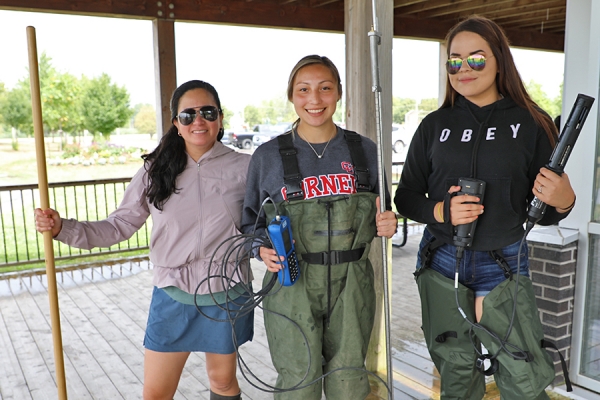 In this 2019 photo, UWindsor researcher Catherine Febria trains Bkejwanong youth Kaitlyn Issac and Taylor Myers to conduct ecological studies on Walpole Island.
In this 2019 photo, UWindsor researcher Catherine Febria trains Bkejwanong youth Kaitlyn Issac and Taylor Myers to conduct ecological studies on Walpole Island.
With the help of UWindsor researcher Catherine Febria, the Walpole Island Land Trust has been awarded money to train students to conduct ecological studies during the ongoing pandemic.
The $95,300 grant comes from the Ontario Trillium Foundation’s Resilient Communities Fund. The fund is designed to help the non-profit sector cope with the effects of COVID-19.
The land trust — a registered charity founded by Clint Jacobs, an adjunct Indigenous scholar in UWindsor’s Faculty of Science — will use the grant to fund research like the monitoring of bird, frog, and freshwater mussel populations; taking inventory of plant species in the prairie grassland; and clearing invasive phragmites from wetlands, streams, and riverbanks.
It will set up outdoor classrooms and outfit students with protective personal equipment. It will also buy equipment it needs to create digital content to move programs online.
“We are grateful for this opportunity from the Ontario Trillium Foundation,” said Montana Riley (BSc 2017), eco-education co-ordinator at Nin.Da.Waab.Jig, the Walpole Island Heritage Centre.
“With this support, our community will rebuild and recover from the impacts of COVID-19 by co-ordinating, implementing, and amplifying efforts to deliver programs for youth, Elders, and Knowledge Keepers to steward our land and water."
Dr. Febria’s Healthy Headwaters Lab will process samples collected by the Bkejwanong Eco-keepers, the Walpole Island First Nation students conducting the surveys. With Jacobs, Febria leads field courses on Walpole Island and helped students apply for the Trillium grant, training that will help them and the territory apply for other grants in the future.
Her lab employs Indigenous scientists and includes an Indigenous Knowledge Circle run by Candy Donaldson.
“We meet regularly to ensure the community’s priorities are incorporated in everything we do,” Donaldson said. “We look for ways to bridge science and Indigenous knowledge in a good way.”
Febria said she was heartened to learn the grant application was successful.
“During the pandemic, nature has been a such a source of wellness for everyone,” Febria said. “This grant acknowledges that and will help keep youth engaged.”
Destiny Soney, a fourth-year Indigenous student studying environmental engineering who works in Febria’s lab, said working on the grant application was a valuable experience.
“It’s a good feeling to know this is something we can accomplish and perhaps keep getting funding for into the future,” she said. “It’s a real hope that we can inspire our students to pursue careers in the environmental sector or otherwise embrace stewardship and conservation.”
—Sarah Sacheli
